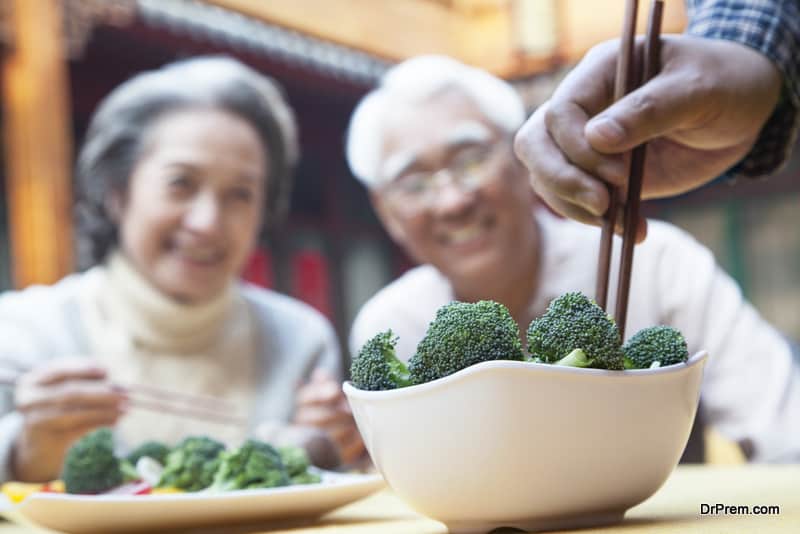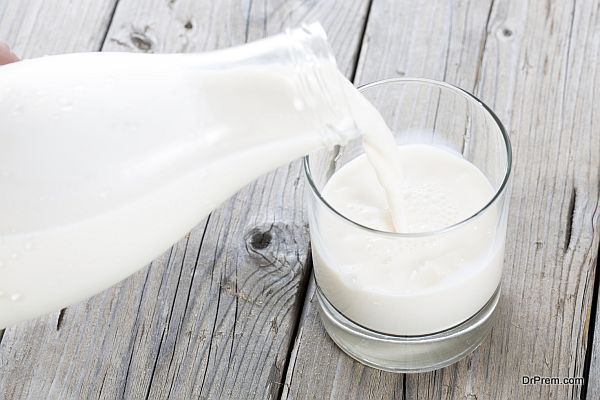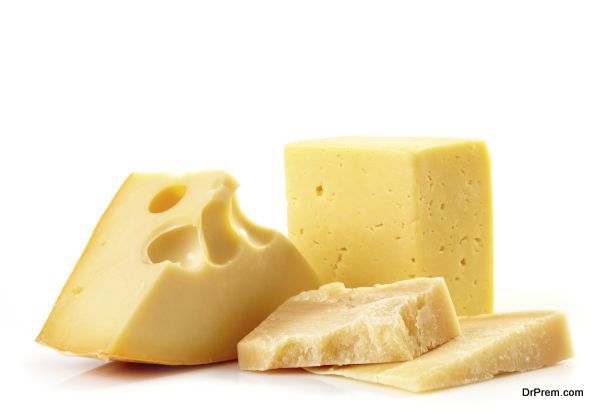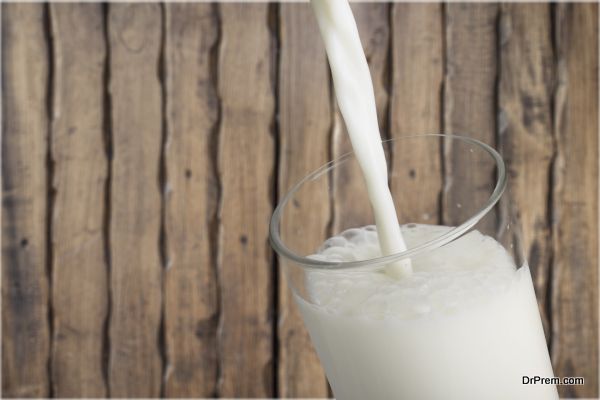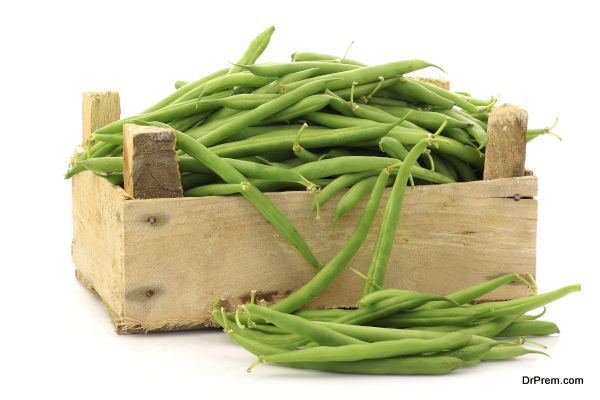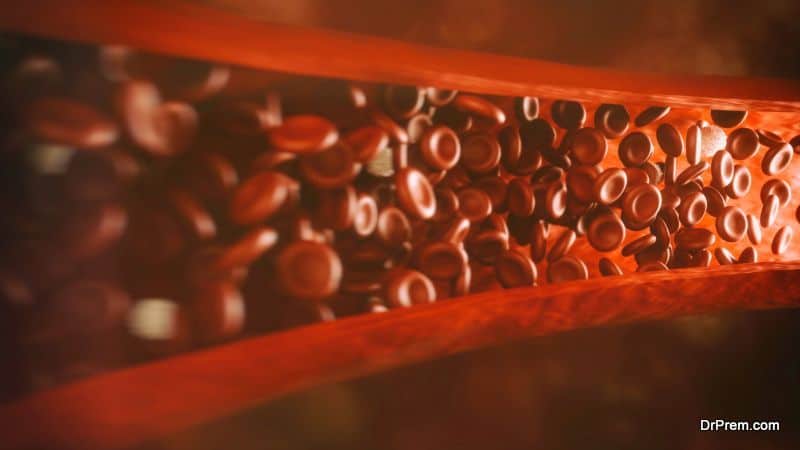Calcium helps to keep our teeth and bones healthy and strong apart from playing an important role in the functioning of many other systems of the body. Lack of calcium can lead to serious health concerns and diseases like osteoporosis. Calcium requirement varies with age and for elderly people a daily intake of 1,300 mg is the ideal amount. To meet this requirement, elderly people must consume calcium-rich foods on a daily basis while making sure that the food that they include in their diet is easily digestible. Milk, cheese, yogurt, certain kinds of fish, beans, tofu, broccoli, kale and soy milk are 9 foods that are high in calcium as well as suitable for elderly people.
How to get calcium absorbed in the body?
The best source of vitamin D is sunlight. Elderly people too need moderate exposure to sunlight for proper calcium absorption. It is said that everything in moderation is good for health. Too much of sunlight could give you skin cancer. More important is to keep the calcium in the body rather than consuming it and excreting it. Exercising is important for stronger bones. The body retains calcium by including exercising in your regime.
10 Best sources of calcium for elderly:
-
Milk
Milk is one of the best sources of calcium and removing it from the diet may result in inadequate intake of calcium. Apart from providing calcium, milk also provides you with some essential minerals and vitamins. Milk is easily digested and absorbed by the body and hence is an ideal choice for elderly people. Fat-free milk is the best choice as the higher the fat in milk, the lesser calcium you get from it. A cup of skimmed milk can provide you with 306 mg of calcium. There are no side-effects of milk. However, if you are intolerant to lactose you should refrain from consuming milk.
2. Cheese
Cheese, being a dairy product, is high in calcium and protein. Most cheeses have a high fat or salt content which are not desirable for you. Therefore, you should always check the fat and salt content while indulging in cheese. You should choose to eat reduced-fat hard cheeses. Cottage cheese and quark are less in fat but provide a decent amount of calcium to you. Though, ricotta and hard parmesan provide you with the highest content of calcium. Cheese is very versatile and therefore can be added to any food and incorporated in your diet. However, if you are lactose intolerant, you should avoid including cheese in your diet.
3. Yogurt
Apart from being very high in calcium, yogurt also contains many other essential minerals. Around 2 1/2 to 3 cups of fat-free yogurt in a day alone can meet the daily calcium requirement of the body of an elderly person. There are no ill side effects of yogurt. Rather it contains good bacteria that improves digestion. Yogurt is easily available and can also be prepared conveniently at your own home. The only people who may have a problem with yogurt and may have to avoid consuming it are people with lactose intolerance.
4. Tofu
Apart from being high in taste, tofu is a great source of calcium with high contents of the mineral in it. While 1/2 cup of firm tofu contains 80 mg of calcium, same quantity of regular tofu can benefit you with 135 mg of the mineral. Though, tofu processed with calcium sulfate is richer in calcium. Therefore, firm and calcium fortified tofu of 1/2 cup can provide you with 204 mg of calcium while the softer variety prepared with calcium sulfate can provide you 138 mg of calcium in a serving of 1/2 cup. So, check labels and look out for the processing agent in the list of ingredients while purchasing tofu. Include mashed, stir-fried, baked or other forms of tofu in your regular diet without any concern of any negative or ill-effect.
5. Soy milk
Soy products are naturally high in calcium. Soy milk is not exceptional in this case and offers you high content of the mineral. Calcium fortified soy milk is a great source of calcium that is easily absorbed by the body as mostly the soy milk is fortified with vitamin D that helps in the absorption of the mineral. An 8 fluid oz serving of fortified soy milk would offer you around 200mg-300mg of calcium. So, for a cup of this drink, you get around 368mg of calcium. However, the taste of soy milk may not always be liked. You can therefore add it to baked goods, casseroles and cereals to include it in your diet and get the benefit out of it.
6. Beans
Beans are not only good source of protein but are also quite high in calcium content. Soy beans, white beans, lima bean, navy bean, cow peas, baked beans, etc. are all good sources of this mineral. Out of all the different kinds of beans, cooked cow peas, cooked green or mature soy beans and canned white beans contain the highest amount of calcium in them. Every 1/2 cup of these beans carry something between 88mg to 130mg of calcium. But in comparison to diary products or other foods with high calcium content, beans contain lower or lesser amounts of the mineral and hence fulfilling your daily calcium requirement with the help of beans alone may not be a good or practical choice.
7. Broccoli
Broccoli contains high amount of calcium in it while being very easy to digest. 1 cup of cooked broccoli can provide you with anything between 45mg-100mg of calcium and around 50-60 percent of it is readily absorbed by the body. Include broccoli in your lunch or dinner regularly and your body will be provided with a good amount of the daily requirement of calcium. Broccoli is easily available and there are no such side effects of it. Therefore, it can be consumed by all. And because it is easily digestible, it is highly suggested for elderly people.
8. Kale
Kale, another leafy green vegetable with high content of calcium in it. Kale is easy to digest too and the calcium contained in kale is readily absorbed by the blood stream. Hence, kale becomes an obvious choice for elderly people to meet their calcium requirement. A 1/2 cup serving of cooked kale can offer you around 90 mg of calcium. Kale can be eaten raw or in cooked form.
9. Fish
Certain kinds of fish are good sources of calcium apart from being high in protein content. Canned salmon, sardines, lobster, crab, pilchards, etc. contain good amount of calcium in them. Canned sardines and canned salmon with bones are the best sources of calcium in this category. Every 3 oz serving of canned pink salmon can provide you with 180 mg of calcium while the same quantity of canned sardines provides you with more than 320 mg of the mineral.
10. Spinach
Popeye’s favorite food is actually a great source of calcium, iron, vitamin A and fiber. Milk and milk products are known to have a good amount of calcium in them. Some people do not like the dairy products. Spinach will meet their calcium demands, at least 25% of the required daily dose – assuming that they consume a minimum of one cup cooked spinach in a day.


